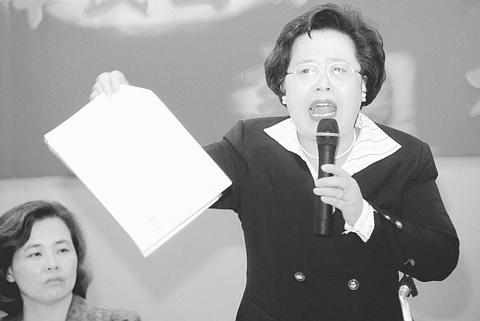The Fair Trade Commission (FTC) has ruled that it currently sees no signs of monopoly in the local cable TV market.
This statement was made after independent cable TV operators, media experts and consumers' rights groups yesterday called on the FTC to investigate the alleged monopoly by conglomerates of the local cable TV market.
"The commission has not discovered any illegal concerted action on the part of cable operators so far, but it will keep an eye out for any developments," said the FTC's deputy chairman Liu Tsung-jung (

PHOTO: CHEN CHENG-CHANG, TAIPEI TIMES
Independent cable operators disagreed, claiming two multi-system operators, Eastern Multimedia and United Communications, are monopolizing the cable TV market as well as aligning themselves with major channel agents.
"They [referring to the two conglomerates] are in control of the cable TV market and are gradually squeezing us out," said Frank Lai (
The two groups control over two-thirds of Taiwan's cable TV market, and are also aligned with the biggest channel agent in Taiwan, forming what he calls the "three-in-one" (
At the beginning of each year, cable providers and channel agents who provide programming such as HBO and Cinemax regularly engage in price wars. Cable companies shut down some of the most popular movie channels such as HBO or move them to higher channel numbers if the price offered by the agents for these channels are not to their satisfaction.
Lai said the channel agent for HBO was pressured by two conglomerates to lower their price during recent negotiations. This was clearly a concerted effort by larger cable operators, he added.
He also said the cable companies under the banner of the two conglomerates threatened to shut down HBO channels if their negotiation over contract renewal failed.
The Government Information Office stepped in as a mediator between the two parties and yesterday was able to announce that cable operators under the two conglomerates had agreed to continue broadcasting HBO even as negotiations continued past the current expiration of their contract on Jan 8.
Lai said that independent cable TV companies like his own in Taichung are under similar pressure.
"The intention of the `three-in-one' group is clear -- to exterminate independent system operators [cable companies] once and for all," he said.
Other independent cable operators also accused the Cabinet-level FTC of "ignoring the monopoly" in the local cable TV market by the two conglomerates.
Roger Hsi (
Joann Su (
The two conglomerates have control over 80 percent of the local cable TV market, and there is often only one cable provider in each district, depriving consumers' of the right to choose from various cable providers, she said.
"The consumers' only option is to subscribe to the only cable provider available," she said.
"So there has been a serious monopoly in the cable TV market. The foundation would call for the FTC to investigate the situation. If unfair competition is confirmed, the FTC is entitled to punish [violators] with fines of up to NT$15 million."

A Chinese aircraft carrier group entered Japan’s economic waters over the weekend, before exiting to conduct drills involving fighter jets, the Japanese Ministry of Defense said yesterday. The Liaoning aircraft carrier, two missile destroyers and one fast combat supply ship sailed about 300km southwest of Japan’s easternmost island of Minamitori on Saturday, a ministry statement said. It was the first time a Chinese aircraft carrier had entered that part of Japan’s exclusive economic zone (EEZ), a ministry spokesman said. “We think the Chinese military is trying to improve its operational capability and ability to conduct operations in distant areas,” the spokesman said. China’s growing

Taiwan yesterday denied Chinese allegations that its military was behind a cyberattack on a technology company in Guangzhou, after city authorities issued warrants for 20 suspects. The Guangzhou Municipal Public Security Bureau earlier yesterday issued warrants for 20 people it identified as members of the Information, Communications and Electronic Force Command (ICEFCOM). The bureau alleged they were behind a May 20 cyberattack targeting the backend system of a self-service facility at the company. “ICEFCOM, under Taiwan’s ruling Democratic Progressive Party, directed the illegal attack,” the warrant says. The bureau placed a bounty of 10,000 yuan (US$1,392) on each of the 20 people named in

Nine retired generals from Taiwan, Japan and the US have been invited to participate in a tabletop exercise hosted by the Taipei School of Economics and Political Science Foundation tomorrow and Wednesday that simulates a potential Chinese invasion of Taiwan in 2030, the foundation said yesterday. The five retired Taiwanese generals would include retired admiral Lee Hsi-min (李喜明), joined by retired US Navy admiral Michael Mullen and former chief of staff of the Japan Self-Defense Forces general Shigeru Iwasaki, it said. The simulation aims to offer strategic insights into regional security and peace in the Taiwan Strait, it added. Foundation chair Huang Huang-hsiung

PUBLIC WARNING: The two students had been tricked into going to Hong Kong for a ‘high-paying’ job, which sent them to a scam center in Cambodia Police warned the public not to trust job advertisements touting high pay abroad following the return of two college students over the weekend who had been trafficked and forced to work at a cyberscam center in Cambodia. The two victims, surnamed Lee (李), 18, and Lin (林), 19, were interviewed by police after landing in Taiwan on Saturday. Taichung’s Chingshui Police Precinct said in a statement yesterday that the two students are good friends, and Lin had suspended her studies after seeing the ad promising good pay to work in Hong Kong. Lee’s grandfather on Thursday reported to police that Lee had sent